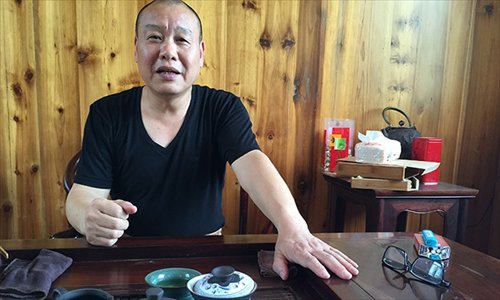
Shi Zhitong (Photo: Courtesy of Southern Weekly)
More Buddhist monks in China are alleged to be fake who presided over temples and collected substantial money in the name of Buddhist ceremonies, following the recent sex scandal of a Shaolin Temple abbot.
Shi Yongxin, the abbot of the Shaolin Temple in Central China's Henan Province, was accused by a self-proclaimed follower of the temple on July 25 that the abbot maintained sexual relations with several women and had illegitimate children.
The scandal escalated after the whistle-blower disclosed identifications on July 28 to prove the abbot was expelled from the temple in 1988 and revealed the identity of one woman who is allegedly the mother of Shi Yongxin's illegitimate child.
Amid heated discussion about Shi, another revered monk in Wenzhou, Zhejiang Province has been hit by a scandal after his son's ex-girlfriend exposed that he was a fake monk with luxurious lifestyle.
Further investigation conducted by the Guangdong-based newspaper Southern Weekly revealed that similar fake monks can be widely found across the country, who have creamed off large sums of money and destroyed the reputation of the religion.
Fake monk
Shi Zhitong, 54, the abbot of two temples in Cangnan county in East China's Zhejiang Province, was exposed by a woman surnamed Wang on her Sina Weibo account in June.
"Although he became a monk at 14, he has a wife. He loves beef instead of vegetables and drives luxury cars such as Land Rover and Audi A8. When he is traveling, he stays in five-star hotels…" Wang wrote in her Weibo while describing the abbot's life in Longhui Temple in Cangnan.
Wang is the ex-girlfriend of Shi's son. The couple ran into a dispute after she gave birth to a baby.
"Shi has many houses and stores in Shanghai, Hangzhou and Wenzhou," Wang told the newspaper, noting that Shi's wife has no permanent job and his son, 31, has been doing business after graduating from university.
Shi has many friends in political, business and cultural circles, added Wang.
Shi is the vice president of Buddhist Association of Cangnan and the only Buddhist member of Wenzhou Committee of the Chinese People's Political Consultative Conference (CPPCC).
However, a statement from the Buddhist Association of Wenzhou sent to the Southern Weekly this year identified him as a fake monk who has never been registered by the association.
Chen Shihong, deputy director of Cangnan's ethnic and religious affairs bureau, refused to make comment on why Shi became the city's only Buddhist CPPCC member, while Huang Linhua, a member of the Wenzhou CPPCC, said that "Shi was recommended by the local united front work department but I did not know about more details."
The Buddhist Association of Wenzhou said in a statement that it has never appointed Shi to any positions and has rejected applications from the county Buddhist association recommending him for CPPCC membership several times.
"We have no idea how he finally became a CPPCC member," read the statement.
However, Shi denied Huang's accusation, saying he neither ate meat nor transferred the temple's money to his family.
"I became a monk at the age of 14 and got married in 1984. After that, I had been cultivating myself and got divorced in 2014," Shi said.
Huge interests
"After I exposed fake Buddhists, they have been taking revenge against me," said Hangzhou-based lawyer Qian Ming (pseudonym), who revealed the underground business conducted by fake Buddhists at a temple in an unnamed city in Zhejiang Province.
Qian said that the temple could easily earn 3 million yuan ($483,000) annually from followers' donations and Buddhist ceremonies, and the money went into their personal accounts as there is no financial supervision of the temple.
"The monks came from Henan Province. They neither had religious or government certificates nor were registered by the local Buddhist association and religious affairs department," said Qian, adding that the leading monk was exposed to be possessing two ID cards with one being used for marriage, raising children and conducting business.
"Almost all the Buddhist ceremonies [in Leqing] have been controlled by at least 400 fake monks from Jiangsu Province," a monk at Leqing in Zhejiang told the newspaper.
"Most fake monks in Wenzhou came from Jiangsu Province while monks in other cities including Jinhua and Lishui hailed from Sichuan Province," a Zhejiang-based monk said.


















































